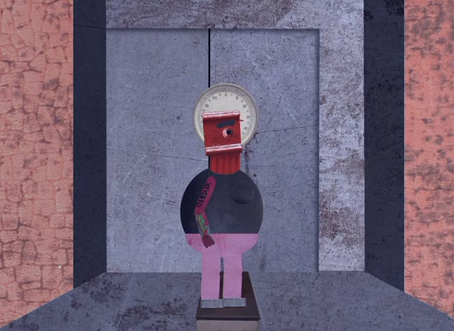At first, the elevator is standing still, so you and the scale are standing still.
一开始,电梯静止不动,你和体重计一样静止不动。
The two forces on you are equal and opposite.
你身上的作用力相等且相反。
You can read how hard the scale is pushing by looking at it.
看体重计就知道正向力有多大了。
We call that your weight.
这就是所谓的体重。
Then, the elevator starts falling down.
然后,电梯开始下降。
You and the scale are in the elevator, so you are falling down too, faster and faster.
你和体重计也跟着一起下降,速度越来越快。
That means you are accelerating downward.
这代表你加速向下。
Now there is a net force in the same direction as the acceleration down.
此时,有一净外力和加速度同方向。
Since gravity hasn't changed, that must mean the scale isn't pushing up as hard.
既然地心引力从未改变,就代表体重计的垂直抗力不够大。
So the scale is reading a smaller number.
因此体重计上显示的数值较实际小。

The faster the elevator accelerates, the less the scale pushes up.
由此可知,电梯下降速度越快,体重计的正向力越小。
What if you jumped? Would you stop falling?
如果你向上跳呢?你会停止下降吗?
Would the elevator hit your head?
还是会撞到天花板呢?
Well, what's pulling the elevator down? Gravity.
想想电梯为何会下降?是因为地心引力。
Is gravity pulling on you? Of course.
那地心引力是否也对你作用?当然。
So your relative position in the elevator will stay the same.
所以你在电梯的位置不变。
The ceiling will only hit you if you can jump up to the ceiling.
你也不会撞到天花板,除非你本来就能跳到天花板上。
Now consider: what would happen if the elevator accelerated upward and, even more frightening, if someone snuck in and cut the cable holding the elevator, what would happen then?
最后,想象一下,如果电梯上升时更恐怖的事情发生了,如果有人闯进电梯井道、剪断钢索会发生什么事?
Think about it.
想想看。












